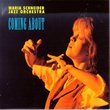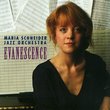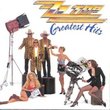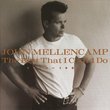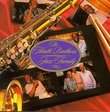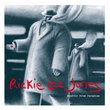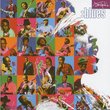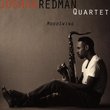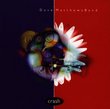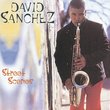| All Artists: Maria Schneider Title: Allegresse Members Wishing: 4 Total Copies: 0 Label: Enja Justin Time Release Date: 6/10/2003 Genres: Jazz, Pop Styles: Avant Garde & Free Jazz, Swing Jazz, Orchestral Jazz Number of Discs: 1 SwapaCD Credits: 1 UPC: 068944330621 |
Search - Maria Schneider :: Allegresse
 | Maria Schneider Allegresse Genres: Jazz, Pop
There have been very few orchestral composers in jazz who achieved creative success, if only because such a combination of talents--from logistics to force of will to the openness to input from the players--is wildly rare.... more » |
CD DetailsSynopsis
Amazon.com There have been very few orchestral composers in jazz who achieved creative success, if only because such a combination of talents--from logistics to force of will to the openness to input from the players--is wildly rare. Maria Schneider, once a protégée of Gil Evans, has been demonstrating those talents since her orchestra's debut in 1994, Evanescence. The vagaries of big bands make working relationships particularly important, and Schneider is attuned to every nuance and timbre of her musicians. It shows in the superb sectional play, the sensitivity to dynamics, and the gorgeous combinations of alto flutes, English horn, clarinets, and piccolo trumpet. Each of Schneider's pieces here is a full-fledged composition, a rich tapestry filled with subtle shifts in voicing, airy highs or welling depths, and frequent surprise. Her expressive range is vast, from the opening "Hang Gliding," air-borne on a Brazilian beat, to the unfolding mysteries of the 21-minute "Dissolution," including reed writing that creates the illusion of strings. At the same time, she's developed a distinctive tonal language that suggests a suite of linked pieces. Each work features just one or two soloists, and there's an uncanny relationship between the writing and improvising, including Frank Kimbrough's crystalline piano on "Nocturne," a piece that suggests Evans's writing for Sketches of Spain, and Ben Monder's acutely focused, energetic guitar on "Journey Home." The piquant "Allegresse" is a continuous evolution of relations between the orchestra, Ingrid Jensen on flügelhorn and harmon-muted trumpet, and Rich Perry on tenor saxophone. --Stuart Broomer Similar CDs
Similarly Requested CDs
|
CD ReviewsMusic of startling beauty and huge accomplishment Jan P. Dennis | Monument, CO USA | 12/20/2004 (5 out of 5 stars) "Maria Schneider has rightly been accorded the highest accolades for her arranging abilities, consistently winning top jazz readers and critics polls. Until this spectacular recording, her composing and band-leading abilities have lagged slightly behind. Allegresse changes all that. She's managed to retain--even extend--the brilliance of her arrangements while adding riveting compositions and consummate band leadership. And what a band it is! This strikes me as the most fluid, most accomplished, most consistently brilliant big band ever. Featuring some of the absolute best players at their positions, especially Frank Kimbrough, my current favorite pianist; Ben Monder, perhaps the best of the younger guitarists; Tony Scherr, a masterful acoustic and electric bassist; and Jeff Ballard, a percussionist of the very first rank, the band also includes lesser-known but equally accomplished players like Rich Perry, Rick Margitza, Charles Pillow, and Scott Robinson (winds); and Dave Ballou and Greg Gisbert, trumpets. They tackle the difficult and tricky charts with uncanny fluidity combined with a kind of offhand bravado that is never less than interesting and often approaches pure genius. I confess, big band is among my least favorite types of jazz. Too often I find a kind of slickness and empty virtuosity replaces true feeling and emotional depth. Not here. Technical playing of the absolute highest accomplishment effortlessly melds with vast panoramas of musical coloration and hugely evocative compositions stunningly arranged to produce a listening experience of the first order. This is glorious music of great feeling and beauty." Maria Schneider's Best! John Tapscott | Canada | 10/17/2001 (5 out of 5 stars) "I was very impressed by Scheider's previous CD's on Enja, "Evanessence" and "Coming About," but I found them hard to really love. There is a slight "clinical" feel to them and in places the music is almost frightening in its intensity ("Bombshelter Beast" on Coming About, for example). I put off buying Allegresse for a while because of my experience with these two CD's. I knew I would have to wait for a time when I was ready for some really challenging music. I should not have delayed getting this CD, however. Allegresse is a beautiful album, which I played three times on the day it arrived. Schenider's characteristic complexity is still here, but overall the music is warmer and more appealing. The hard edges have given way to softer pastels and the music seems to have more "room to breathe." There is still plenty of bite, however, and there are some intense passages, most notably on Dissolution, which feaures excellent soprano sax by Tim Ries. Schnieder is not so much a writer of memorable melodies, but a weaver of textures which keep unfolding throughout these long pieces, of which "Journey Home" is my personal favorite. The soloists are all excellent, but it is the ensemble sound which remains in the listener's mind. There is so much music here that it will take you many listens to fully explore its riches. This is easily Maria Schnieder's best and most appealing CD to date. Highly recommended." Okay Michael J Edelman | Huntington Woods, MI USA | 10/22/2004 (3 out of 5 stars) "Maria Schneider's really hot now, and, well, while she's a really great orchestrator and arranger, she's just not a terribly interesting composer. If you compare her to her mentor, Gil Evans, or to Oliver Nelson, it's obvious that she's right up there with the greats when it comes to voicing a piece for an ensemble. She's better at arranging than a lot of my favorite composers, like Carla Bley. What's missing is theme and development.
There's a lot going on in Schneider's compositions- so much that none of them really have a unifying theme of any sort. If you think back to the Great Gil Evans/Miles Davis collaborations, or Oliver Nelson, or Mingus, every piece has some strong theme that characterizes the composition. No matter how outside the harmony or free the structure, there's a core there, a theme that gets stuck in your head. Something you can whistle. And that's what's missing here." |

 Track Listings (6) - Disc #1
Track Listings (6) - Disc #1